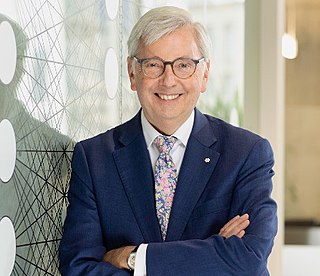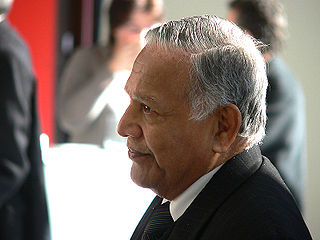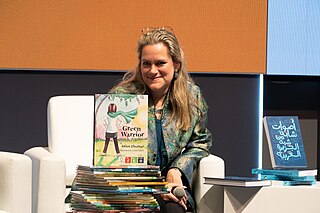
Charles Doherty Gonthier, was a Puisne judge on the Supreme Court of Canada from February 1, 1989, to August 1, 2003. He was replaced by Morris Fish.

Stephen John Toope is a Canadian legal scholar, academic administrator and a scholar specializing in human rights, public international law and international relations. In November 2022, he was appointed as the fifth President and CEO of the Canadian Institute for Advanced Research (CIFAR). Prior to this, he served for five years as the 346th Vice-Chancellor of the University of Cambridge.
Mads Andenæs KC is a legal academic and former UN special rapporteur on arbitrary detention and the chair of UN Working Group on Arbitrary Detention. He is a professor at the Faculty of Law of the University of Oslo, the former director of the British Institute of International and Comparative Law, London and the former director of the Centre of European Law at King’s College, University of London.

Christopher Gregory Weeramantry, AM was a Sri Lankan lawyer who was a Judge of the International Court of Justice (ICJ) from 1991 to 2000, serving as its vice-president from 1997 to 2000. Weeramantry was a judge of the Supreme Court of Sri Lanka from 1967 to 1972. He also served as an emeritus professor at Monash University and as the president of the International Association of Lawyers against Nuclear Arms.

Science Policy Research Unit (SPRU) is a research centre based at University of Sussex in Falmer, near Brighton, UK. It focuses on long term transformative change, science policy and innovation across different sectors, societies and structures. It was one of the first interdisciplinary research centres in the field of science and technology policy and at the forefront of the development of innovation as an academic discipline. Alongside internationally renowned research, SPRU also offers a range of MSc courses, as well as PhD research degrees.
Jennifer M. Wilby is an American and UK management scientist, and past director of the Centre for Systems Studies, and a senior lecturer and researcher in management systems and sciences in The Business School, University of Hull. She served as president of the International Society for the Systems Sciences for the term 2010–2011.

The Balsillie School of International Affairs (BSIA) is a centre for advanced research and teaching on global governance and international public policy, located in Waterloo, Ontario. As one of the largest social sciences initiatives in Canada, the school is a collaborative partnership between the University of Waterloo, Wilfrid Laurier University, and the Centre for International Governance Innovation. The BSIA is an affiliate member of the Association of Professional Schools of International Affairs, a group of schools that educate leaders in international affairs. The BSIA is housed in the north and west wings of the CIGI Campus. Admission to BSIA is highly selective.

Ian James Norman is a British nursing researcher and author, based in Surrey, UK. His research and writing is focused primarily in the fields of psychiatric and mental health nursing, and psychological treatments for people with mental health difficulties. Norman is Emeritus Professor of Mental Health in the Faculty of Nursing, Midwifery & Palliative Care at King's College London. He is a former Executive Dean of Faculty and Assistant Principal (Academic Performance) at King's. He is the Editor-in-Chief of the International Journal of Nursing Studies and a practising cognitive behavioural psychotherapist.

Tan Sri Zakri bin Abdul Hamid has had a distinguished career in science as a researcher, educator, administrator and diplomat.
In 2016 the Women's Engineering Society (WES), in collaboration with the Daily Telegraph, produced an inaugural list of the United Kingdom's Top 50 Influential Women in Engineering, which was published on National Women in Engineering Day on 23 June 2016. The event was so successful it became an annual celebration. The list was instigated by Dawn Bonfield MBE, then Chief Executive of the Women's Engineering Society. In 2019, WES ended its collaboration with the Daily Telegraph and started a new collaboration with The Guardian newspaper.

Marie-Claire Cordonier Segger is a full professor, senior executive, an international expert in policy, law and governance on climate change, biodiversity, human rights, trade, investment and financial law and the world's Sustainable Development Goals. She currently serves as Leverhulme Trust Visiting Professor at the University of Cambridge, UK; executive secretary of the global Climate Law and Governance Initiative (CLGI) and senior director of the Centre for International Sustainable Development Law (CISDL). She is also a Fellow in Law & LLM/MCL Director of Studies at the Lucy Cavendish College; fellow at the Lauterpacht Centre for International Law; visiting fellow at the Bennett Institute for Public Policy and Fellow at the Cambridge Centre for Energy, Environment & Natural Resource Governance. Further, she is full professor at the University of Waterloo School of Environment, Enterprise and Development in Waterloo, Ontario, Canada, where she is also senior fellow at the Balsillie School of International Affairs (BSIA) and senior advisor to the Interdisciplinary Centre on Climate Change (IC3). She serves as chair of the Convention on Biological Diversity (CBD) Biodiversity Law & Governance Initiative; rapporteur for the International Law Association Committee on Sustainable Natural Resources Management; co-founder member of the board of the Sustainable Development Solutions Network (SDSN) of Canada; member of the International Law Association (ILA) Board of Canada; co-founder and councillor of the World Future Council.
Ashfaq Khalfan is an international jurist in human rights law, Director of the Law and Policy Programme at Amnesty International, and Chair of the Board of Governors of the Centre for International Sustainable Development Law.
Dr. Sumudu Anopama Atapattu is an international jurist in human rights, environmental and climate change law, and both a Senior Lecturer and Director of Research Centers at the University of Wisconsin Law School. She is an Attorney-at-Law of the Supreme Court of Sri Lanka, an Affiliated Professor at the Raoul Wallenberg Institute in Sweden, and Lead Counsel for Human Rights and Poverty Eradication at the Centre for International Sustainable Development Law.
Alexandra Harrington is an international jurist in human rights, environmental and climate change law, and both a Professor of Law at Albany Law School and Assistant Director of the Global Institute for Health and Human Rights. In addition, Harrington is Director of Studies for the International Law Association of Colombia, a member of the ILA Committee on the Role of International Law in Sustainable Natural Resource Management for Development, and is Lead Counsel for Peace, Justice and Governance at the Centre for International Sustainable Development Law.
Valentina Alejandra Durán Medina is an international jurist in environmental and climate change law, and both a Professor of Law at Universidad de Chile and Director of the Centre for Environmental Law (CDA). In addition to coordinating the Clinic of Environmental Law and Conflict Resolution, Durán is Lead Counsel for Peace, Justice and Governance at the Centre for International Sustainable Development Law.
The Voices of Future Generations (VoFG) Initiative was launched on the 25th Anniversary of the United Nations Convention on the Rights of the Child by a consortium of partners including World Future Council, Centre for International Sustainable Development Law, the Office of the Commissioner for Fundamental Rights in the Government of Hungary, and the Trust for Sustainable Living, with the support of the United Nations Educational, Scientific and Cultural Organization.
The Climate Law and Governance Initiative is an international consortium of partners in the climate law community working to build capacity and knowledge relating to law and governance approaches to address climate change. Ongoing research projects carried out by its partner institutions support the hosting of events and specialized capacity-building workshops in parallel with the annual climate negotiations under the UNFCCC. The initiative's focus is the effective implementation of SDG 13 on Climate Change. Its events are officially endorsed by the UNFCCC.

Mahnaz Malik FRGS is a British-Pakistani barrister, arbitrator, and author. She is involved with improving co-operation between Pakistan and the UK and the US. She obtained European and UK funding to establish a project to give legal assistance to children detained in Pakistan. She specializes in complex international disputes involving investors and states.
Jörg Tremmel is a political theorist and philosopher. He is a professor at Eberhard Karls University of Tübingen, Germany.

Dr. David Sadoff is an American international law and policy expert, specializing in rule of law programming, intelligence affairs, and international enforcement law. He has served as managing director of the Clooney Foundation for Justice, general counsel of the International Development Law Organization, and deputy legal adviser and director of intelligence programs and reform on the National Security Council staff.









